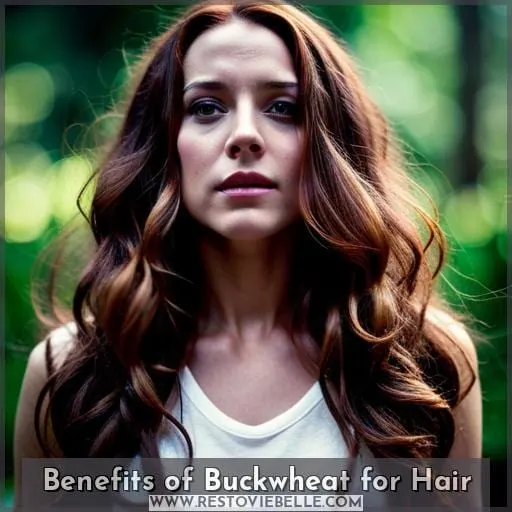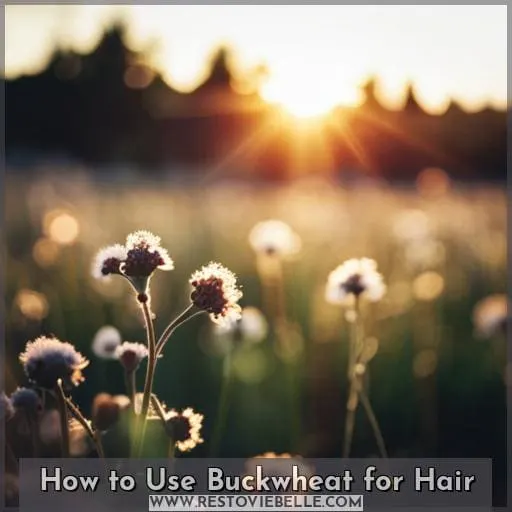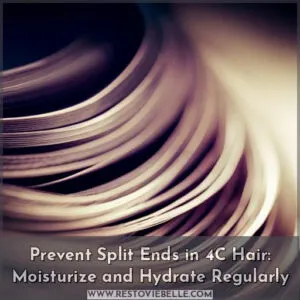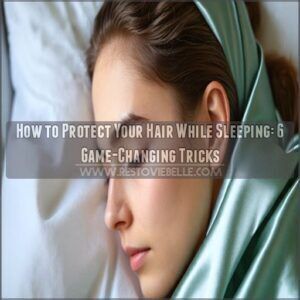This site is supported by our readers. We may earn a commission, at no cost to you, if you purchase through links.
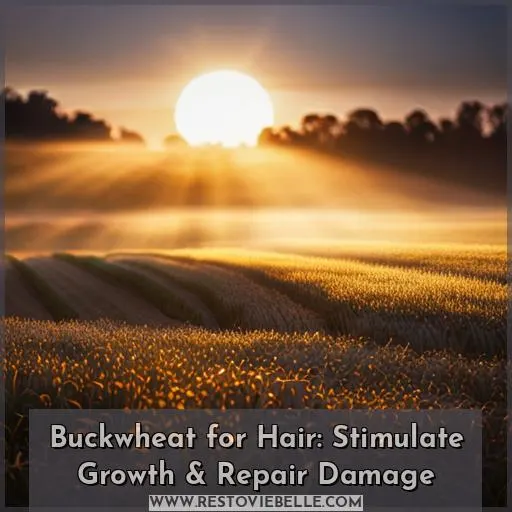 Immerse yourself in the world of buckwheat for hair and discover how to truly nourish your locks. This nutrient-rich seed contains a wealth of benefits that can stimulate growth, repair damage, and help you achieve healthier hair.
Immerse yourself in the world of buckwheat for hair and discover how to truly nourish your locks. This nutrient-rich seed contains a wealth of benefits that can stimulate growth, repair damage, and help you achieve healthier hair.
With its rich source of B vitamins, magnesium, copper, and iron, buckwheat is an amazing ingredient to add to your hair care routine! Whether it’s adding it to your diet or using it as a mask or rinse, learn all the ways you can use this superfood for stronger strands that are full of luster.
Table Of Contents
Key Takeaways
- Buckwheat is rich in nutrients essential for hair health.
- It stimulates hair growth and prevents breakage.
- Buckwheat can be incorporated into the diet for improved hair health.
- Buckwheat-based hair products, like shampoos and hair masks, can nourish and strengthen the hair.
Benefits of Buckwheat for Hair
Are you searching for a superfood to help restore the health of your hair? Buckwheat is an excellent choice; its high levels of B vitamins and minerals stimulate hair growth, aid in achieving healthier hair, can restore damaged locks, strengthen strands to reduce split ends, and more.
With buckwheat as part of your diet or through topical use, you can improve the condition of your tresses.
Stimulates Hair Growth
You can improve hair health with buckwheat’s vitamins and minerals. It stimulates growth, prevents breakage, and fortifies keratin production for thicker locks! The nutritional impact from dietary influences aids in strengthening hair as well as providing overall health benefits.
Buckwheat is an excellent remedy for healthier hair and a great addition to any haircare routine.
Aids in Achieving Healthier Hair
By boosting vitamins and minerals, buckwheat helps you have healthier hair. Complex carbohydrates support growth; amino acids aid keratin production; Vitamin E repairs damaged follicles; minerals smooth cuticles.
Can Restore Damaged Hair
Nourishing your hair with buckwheat can help restore damaged follicles and give you healthier, softer tresses. Complex carbohydrates support growth while vitamin E repairs. Minerals smooth cuticles, and B vitamins strengthen strands.
Strengthens Hair
Amp up your hair care with buckwheat and watch it transform into a strong, luscious crown! Nutrients like vitamin B6 found in buckwheat offer the essential support for healthier hair. Use this superfood to strengthen follicles and restore moisture balance while stimulating natural growth.
Buckwheat flour shampoo is an effective way to incorporate beneficial minerals into your routine, adding strength and shine that rivals any salon treatment.
Reduces Split Ends
Tame those split ends with buckwheat’s powerful minerals! Hair health is improved as vitamins and amino acids promote keratin production. Buckwheat helps prevent breakage, leaving hair thicker, fuller, and softer. Use a leave-in cream to reduce split ends for healthy hair growth.
Incorporating Buckwheat Into Your Haircare Routine
Adding buckwheat to your diet and incorporating it into your hair care routine can have a number of benefits for hair health. Making the switch to a homemade buckwheat flour shampoo is an easy way to reap some of these rewards, while also providing powerful nutrition that supports overall wellness.
Add Buckwheat to Your Diet
Adding buckwheat to your diet can help you reap the rewards of its nutritional benefits and improve your hair health. Rich in minerals, vitamins A and E, amino acids, complex carbohydrates, and fiber; buckwheat provides essential nutrients to support healthier hair growth.
Incorporate versatile recipes into meals for sustained nutrition or make a shampoo from ground groats for softer locks.
Make Your Own Buckwheat Flour Shampoo
Mix up your own buckwheat flour shampoo and give your hair a nourishing boost! Buckwheat’s essential vitamins, minerals, and amino acids support healthier hair growth while also promoting thicker, fuller locks.
Plus, it contains vitamin E to repair damaged follicles and smooth cuticles for softer strands.
To make the vegan pancakes-inspired cleanser at home, you’ll need buckwheat flour. Additionally, gather other natural ingredients like honey or aloe vera gel for scalp health benefits. A nutrient-rich DIY shampoo recipe is not only good for split ends but digestion too.
How to Use Buckwheat for Hair
Using buckwheat in your hair care routine can be an effective way to improve the health of your hair. From making a nourishing and repairing buckwheat hair mask to creating a clarifying rinse, there are many ways you can incorporate this superfood into your beauty regimen.
Buckwheat Hair Mask Recipe
Create a nourishing hair mask by blending buckwheat groats with honey and yogurt for an effective treatment to promote healthier locks. Buckwheat’s B vitamins, minerals, amino acids, complex carbohydrates, and vitamin E help repair damage while smoothing cuticles.
An all-natural DIY solution that supports fuller, thicker hair growth without harsh chemicals or damaging stereotypes of caricatures depicting racist images.
Buckwheat Hair Rinse Recipe
Relax and restore your hair with a nourishing buckwheat rinse! A DIY buckwheat hair rinse can be made from ingredients found in most pantries.
Benefits include:
- Reduced frizz and increased shine.
- Strengthening the scalp and promoting healthy growth.
- Ridding the scalp of bacteria, dirt, or impurities that could lead to breakage or thinning of strands.
Buckwheat is packed with vitamins such as B6 and E, which may help promote healthier hair overall while reducing split ends and dryness for smoother locks! This natural remedy works by coating each strand in protective antioxidants that prevent damage caused by styling tools like curling irons or blow dryers.
Further studies are needed to explore how cultural stereotypes have contributed to the racism debate surrounding classical literature featuring anti-black imagery like Picaninny Caricature, but using this beneficial ingredient helps you get one step closer to achieving beautiful tresses without harsh chemicals!
Other Ways to Promote Healthy Hair Growth
Healthy hair is not only about the products you use but also what nourishes your body from within. To maintain a healthy head of hair, it’s important to practice good hair care habits as well as having a balanced diet with foods that promote hair growth.
Maintain a Balanced Diet
Eat a balanced diet to promote healthy hair growth and maintain overall health. Our dietary choices can have an impact on our bodies, including our hair, so it’s important to ensure we’re getting the right nutrients from fair trade sources.
A nutrient-rich diet that includes whole grains, such as buckwheat, can help strengthen the follicles and provide heart health benefits. Incorporating foods high in vitamins like D and E, along with minerals like zinc, boosts collagen production, supporting healthier-looking locks.
To keep your mane strong and resilient, make sure you’re regularly incorporating these types of foods into your lifestyle. Avoid racial standards when choosing the best nutrition for your hair, creating a safe space for everyone who wants great hair without being oppressed by trends or stereotypes.
Practice Good Haircare Habits
Take the time to regularly practice good hair care habits, such as using conditioner and avoiding harsh chemicals. Scalp health is important for hair growth; use lukewarm water when washing and massage your scalp with fingertips or a soft brush for blood circulation.
Use styling techniques that are gentle on the hair, like air drying instead of heat tools. Invest in quality products designed specifically for your hair type and avoid common hair care myths like shampooing daily or applying too much product at once.
The Role of Nutrition in Hair Health
You may be surprised to know that nutrition plays a key role in hair health and loss. Vitamin D deficiency has been linked to hair loss, while certain foods like high-mercury-rich fish are known to trigger alopecia.
Additionally, excessive food consumption can lead to increased shedding of hairs due to the follicles being overburdened with nutrients or hormones released as a result of digestion.
Vitamin D and Hair Loss
Be sure to get enough Vitamin D in your diet, as deficiencies can lead to hair loss. Vitamin D benefits include improved immunity and bone health, but it also plays an integral role in promoting healthy hair growth.
Studies suggest that dietary influences may influence alopecia or excessive shedding of the scalp’s hair follicles.
Hair health correlations have been linked with adequate levels of nutritional vitamins like vitamin D, so be sure to incorporate foods rich in these nutrients into your meal plan for optimal results!
Foods Linked to Alopecia
Research into alopecia has revealed that certain foods may be linked to this condition. For example, high-mercury-rich fish consumption can trigger hair loss. Studies suggest that buckwheat and millet groats play an important role in reducing baldness associated with alopecia.
Overconsumption of some food items should be avoided as it could lead to excessive shedding of hair strands.
The Impact of Excessive Food Consumption on Hair Shedding
Monitoring your diet is key to understanding how food choices can impact hair health. Shedding occurs when the nutritional balance is off, and excessive consumption of certain foods may be linked to it.
Buckwheat for hair has been shown to reduce breakage and support thicker, fuller locks.
Conclusion
It’s no surprise that buckwheat has been gaining traction as a superfood in recent years. Not only is it a nutrient-rich powerhouse, but it can also benefit hair health when used topically and incorporated into one’s diet.
Those looking for a natural remedy to stimulate hair growth, repair damage, and strengthen locks should look no further than buckwheat. From buckwheat flour shampoos to hair masks, there are a variety of ways to use the grain for hair benefits.
To further promote healthy hair growth, maintain a balanced diet and practice good hair care habits. With a combination of these steps and the use of buckwheat in one’s routine, you can achieve healthier, fuller hair.

